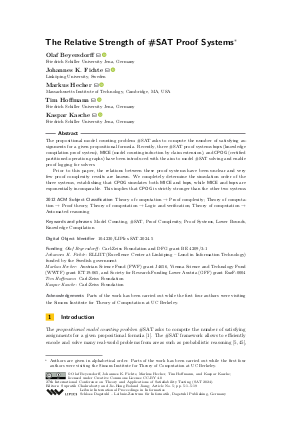LIPIcs.SAT.2024.5.pdf
- Filesize: 0.94 MB
- 19 pages

 Creative Commons Attribution 4.0 International license
Creative Commons Attribution 4.0 International license

The propositional model counting problem #SAT asks to compute the number of satisfying assignments for a given propositional formula. Recently, three #SAT proof systems kcps (knowledge compilation proof system), MICE (model counting induction by claim extension), and CPOG (certified partitioned-operation graphs) have been introduced with the aim to model #SAT solving and enable proof logging for solvers. Prior to this paper, the relations between these proof systems have been unclear and very few proof complexity results are known. We completely determine the simulation order of the three systems, establishing that CPOG simulates both MICE and kcps, while MICE and kcps are exponentially incomparable. This implies that CPOG is strictly stronger than the other two systems.









Feedback for Dagstuhl Publishing